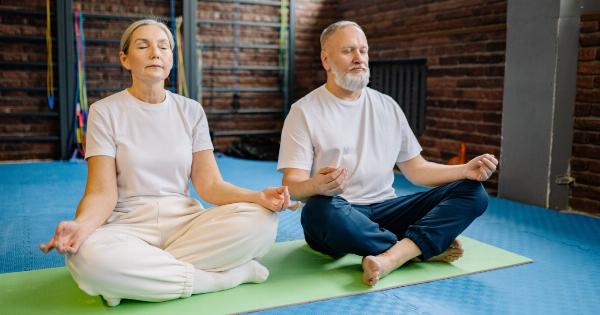Our minds are powerful tools that can be harnessed to achieve incredible things. Just like our bodies, our minds need exercise to stay strong and healthy.
While there are countless ways to work out our bodies, when it comes to training our minds, one simple move stands out above the rest. This move is not only easy to implement, but it also yields tremendous benefits for our mental well-being and overall cognitive function.
The Power of Meditation
Meditation, an ancient practice that has been passed down through generations, has gained immense popularity in recent years as a way to strengthen the mind. Its benefits extend far beyond relaxation and stress reduction.
Research has shown that regular meditation practice can lead to improvements in attention span, memory, creativity, emotional regulation, and overall mental clarity.
How to Get Started
Starting a meditation practice may seem daunting, but it doesn’t have to be. Here are some simple steps to help you get started:.
1. Find a Quiet and Comfortable Space
To meditate effectively, it is essential to find a quiet space where you can be free from distractions. Choose a comfortable spot where you can sit or lie down without feeling any discomfort.
This can be a corner of your room, a dedicated meditation area, or even your favorite park.
2. Set Aside Dedicated Time
Make a commitment to yourself to set aside a specific time each day for meditation. Consistency is key when it comes to reaping the benefits of this practice.
Start with just a few minutes and gradually increase the duration as you become more comfortable with the process.
3. Get Into a Comfortable Position
Whether you choose to sit or lie down, it is important to find a position that allows you to relax and be at ease.
You can sit cross-legged on a cushion, in a chair with your feet flat on the ground, or lie down with a pillow supporting your head and neck.
4. Focus on Your Breath
Once you are settled in a comfortable position, close your eyes and bring your attention to your breath. Take slow, deep breaths, focusing on the sensation of the breath entering and leaving your body.
If your mind starts to wander, gently bring your focus back to your breath without judgment.
5. Notice Your Thoughts
During meditation, thoughts will naturally arise. Instead of getting caught up in them, simply observe them as they come and go, like clouds passing through the sky.
This practice of non-judgmental awareness allows you to detach from your thoughts and cultivate a sense of inner stillness.
6. Start with Guided Meditations
If you are new to meditation, it can be helpful to start with guided meditations. There are numerous apps and online resources available that provide step-by-step instructions and soothing guidance to help you navigate your meditation practice.
7. Gradually Increase Meditation Time
As you become more comfortable with meditation, gradually increase the duration of your sessions. Aim for at least 10-15 minutes of meditation per day, but feel free to extend it as you see fit.
Some experienced practitioners meditate for an hour or more each day.
The Benefits of a Stronger Mind
By incorporating meditation into your daily routine, you can experience the following benefits:.
Improved Concentration and Focus
Regular meditation strengthens your ability to concentrate and enhances your focus.
As you train your mind to stay present and let go of distractions, you become better equipped to pay attention to the task at hand, whether it’s studying, working, or simply engaging in a conversation.
Enhanced Memory and Cognitive Function
Studies have shown that meditation can increase gray matter in the brain, particularly in areas associated with memory, learning, and cognitive function.
This improvement boosts your ability to retain information, think critically, and make sound decisions.
Reduced Stress and Anxiety
Meditation activates the body’s relaxation response, promoting a state of calm and reducing the production of stress hormones.
By regularly practicing meditation, you can establish a greater sense of inner peace, reduce anxiety, and manage stress more effectively.
Increased Creativity
When your mind is relaxed and at ease, your creativity flourishes. Meditation opens up space for fresh ideas and innovative thinking.
The ability to tap into your creative potential can benefit not only artistic pursuits but also problem-solving and generating new perspectives in various areas of life.
Improved Emotional Well-being
Meditation cultivates emotional resilience by helping you develop a greater understanding and acceptance of your emotions.
Regular practice builds your capacity to regulate and control your reactions, leading to improved emotional stability and overall well-being.
Enhanced Self-awareness
Meditation enables you to connect with your inner self and develop a deep sense of self-awareness.
Through introspection and reflection, you gain insights into your thoughts, feelings, and behaviors, fostering personal growth and a stronger sense of identity.






























